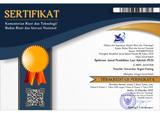The Relationship Between Learning Strategy for Office Aplication With Learning Succes at LKP Widyaloka Bukittinggi
 ), Vevi Sunarti(2),
), Vevi Sunarti(2), (1) Universitas Negeri Padang
(2) Universitas Negeri Padang
 Corresponding Author
Corresponding Author
DOI : https://doi.org/10.24036/spektrumpls.v8i4.110086
Full Text:
 Language : en
Language : en
Abstract
This research was motivated by the low learning success in the office application training at LKP Widyaloka Bukittinggi. Researchers suspect that the cause of the training participants' low learning success is to the lack of implementation of learning strategies by the instructors. The problems studied in this research are, "Is there a relationship between the learning strategy of office applications and the success of studying at LKP Widyaloka Bukittinggi?". This research is to see an overview of learning strategies, an overview of learning success, how the relationship between the two. This research is a correlational study using a quantitative approach. The population in the study amounted to 40 people who met the criteria. While the sample was determined to be 75% of 40, namely 30 people. Data collection in the research was conducted by researchers using a questionnaire technique and the tools used were questionnaires. The data analysis technique uses the percentage formula, the Product Moment formula. It can be concluded that: (1) the learning strategy at LKP Widyaloka Bukittinggi office applications is not good, (2) the success of learning office applications in LKP Widyaloka Bukittinggi is categorized as low. (3) there is a significant relationship between the office application learning strategy and the learning success at LKP Widyaloka Bukittinggi. For this reasons, the authors give several suggestions (1) It is hoped that the instructor in making an attractive media learning strategy method increases high learning success, so that active participants office application training activities LKP Widyaloka Bukittinggi can do well. (2) It is expected that LKP Widyaloka Bukittinggi will improve the quality of learning training for office applications at LKP Widyaloka Bukittinggi. (3) Researchers are expected to examine other variables that affect involvement citizens in learning.
Keywords: learning strategies, learning success.
References
Ahmad Susanto. (2011). Penilaian Hasil dan Proses Belajar Mengajar. Bandung: Rosda Karya.
Aini, W. (2006). Bahan Ajar Konsep Pendidikan Luar Sekolah. Padang: PLS FIP UNP.
Alim, S. (2011). Pemanfaatan ICT Dalam Proses Merancang Dan Mengimplementasikan Model Pembelajaran Inovatif Designed Student Centred Instructional. FT – UNESA. Surabaya. FT – UNESA. Surabaya.
Arifin, Z. (2009). Evaluasi Pembelajaran. Bandung: PT Remaja Rosdakarya.
Arikunto, S. (2016). Prosedur Penelitian: Suatu Pendekatan Praktik. Rineka Cipta.
B.Uno, H. (2008). Model Pembelajaran, Jakarta; PT. Bumi Aksara.
Bartin, T. (2006). Pendidikan Orang Dewasa Sebagai Basis Pendidikan Nonformal. Jurnal TEKNODIK, 10(19), 854–915.
Darmansyah. (2017). strategi pembelajaran. In strategi pembelajaran (p. 242). erka.
Djamarah, S. B. dan A. Z. (2010). Strategi Belajar Mengajar. Jakarta: PT Rieneka CIpta.
Komar, O. (2006). Filsafat Pendidikan Nonformal. Pustaka Setia.
Made Wena. (2010). strategi pembelajaran.
Sari, N., Wahid, S., & Sunarti, V. (2018). (2018). Tanggapan Anggota terhadap Manfaat Pelatihan Public Speaking di Unit Kegiatan Komunikasi dan Penyaiaran Kampus Universitas Negeri Padang. SPEKTRUM: Jurnal Pendidikan Luar Sekolah (PLS), 1 (2), 206-213. Https://Doi.Org/10.24036/Spektrumpls.Vli.9080. https://doi.org/10.24036/spektrumpls.vli.9080
Sudjana, D. (2015). Pendidikan Luar Sekolah: Falsafah, Dasar Teori, Pendukung Azaz. Fallah Production.
Undang-undang No. 20 tahun 2003 Tentang Sistem Pendidikan Nasional. (2003). Departemen Pendidikan Nasional.
 Article Metrics
Article Metrics
 Abstract Views : 268 times
Abstract Views : 268 times
 PDF Downloaded : 62 times
PDF Downloaded : 62 times
Refbacks
- There are currently no refbacks.

This work is licensed under a Creative Commons Attribution-NonCommercial 4.0 International License.



